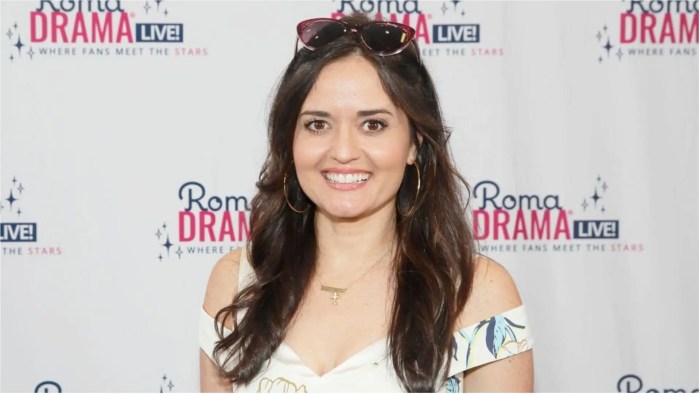Hallmark movies sometimes get a bad rap but danica mckellar defends the ones shes made over the years – Hallmark movies sometimes get a bad rap, but Danica McKellar defends the ones she’s made over the years. This exploration delves into McKellar’s perspective, analyzing the common criticisms leveled against these films, and examining the genre’s characteristics. We’ll see how McKellar’s perspective contrasts with the typical view of Hallmark movies, highlighting both their perceived flaws and their undeniable charm.
McKellar’s passionate defense of her Hallmark films provides a fascinating window into the genre. She argues that these movies often offer heartwarming stories, family values, and a welcome escape. By examining the plots, characters, and target audience, we can better understand why these movies resonate with some viewers while others find them lacking.
Danica McKellar’s Perspective

Danica McKellar, known for her roles in “The Wonder Years” and her mathematical prowess, has been a vocal advocate for Hallmark movies. She often defends these films against criticisms, offering a unique perspective that goes beyond the surface-level entertainment value. Her defense isn’t simply a matter of personal preference; it’s rooted in a deeper appreciation for the positive aspects these films offer.McKellar recognizes the potential for Hallmark movies to be seen as formulaic or predictable, but she counters these perceptions by emphasizing the inherent value in the stories they tell.
While Hallmark movies sometimes get a bad rap, Danica McKellar’s always stood up for the ones she’s made. It’s interesting to see how similar situations play out in other areas, like with Khloe Kardashian’s recent response to critics who constantly scrutinize her after her weight loss and nose job. Khloe Kardashian’s response highlights a larger theme about defending your choices, and reminds me of how important it is to support Danica and her commitment to making quality films.
She appreciates the consistent quality of the storytelling and the thoughtful messages that often underpin the narratives.
While Hallmark movies sometimes get a bad rap, Danica McKellar stands by the ones she’s been in. It’s interesting to contrast that with the recent news that Machine Gun Kelly’s movie with Megan Fox, which received a ton of Razzie nominations , highlighting the wide range of quality in film. Ultimately, though, it seems like Danica is right to champion her Hallmark movies – they’re clearly more enjoyable than some other productions.
Hallmark Movie Defenses
McKellar’s defenses of Hallmark movies extend to various titles over the years. While she hasn’t publicly stated every film she’s defended, her general stance suggests she likely supports many films released by Hallmark. She likely champions the positive messages and heartwarming stories that Hallmark movies typically portray.
Positive Aspects of Hallmark Movies, Hallmark movies sometimes get a bad rap but danica mckellar defends the ones shes made over the years
McKellar likely emphasizes the positive aspects of these films, highlighting elements such as:
- Heartwarming Stories: McKellar likely finds the narratives’ focus on family, love, and overcoming challenges deeply moving. These narratives resonate with audiences seeking emotional connection and positive role models. She might cite the common themes of finding love, supporting family, and overcoming personal struggles.
- Family Values: Hallmark movies frequently showcase traditional family values and the importance of strong relationships. McKellar likely sees these depictions as beneficial for audiences, especially in a time of shifting cultural norms. She might see this as a positive representation of family dynamics.
- Escapism: In a world that can often feel stressful and complicated, Hallmark movies offer a welcome escape. McKellar likely views these films as a form of gentle escapism, providing audiences with a respite from reality. She might describe these films as a chance to unwind and enjoy a simpler, more optimistic portrayal of life.
Comparison of Perceptions
| Negative Perception | McKellar’s Defense |
|---|---|
| Formulaic Storytelling: Often criticized for following a predictable pattern of plots and characters. | Positive Narrative Structures: McKellar likely views the predictable structure as a comfort and a recognizable format that viewers appreciate, enabling them to enjoy a story that they can relate to. |
| Lack of Depth: Some perceive the plots as lacking depth and complexity compared to other genres. | Heartfelt Simplicity: McKellar likely sees the simplicity of these stories as a strength. She might appreciate the focus on emotional connection and relatable characters over complex plots. |
| Overly Sentimental: Some find the films overly sentimental and lacking in realism. | Emotional Resonance: McKellar might view the sentimentality as a positive quality, connecting with audiences who seek emotional engagement and feel-good experiences. |
Analyzing the Criticism of Hallmark Movies: Hallmark Movies Sometimes Get A Bad Rap But Danica Mckellar Defends The Ones Shes Made Over The Years

Hallmark movies, a beloved genre for many, often face criticism for their perceived formulaic nature and sometimes unrealistic portrayals. While these films offer comfort and escapism, they’re not without their detractors. This analysis delves into the common criticisms, exploring their underlying reasons and comparing the target audience with other genres.
While Hallmark movies sometimes get a bad rap, Danica McKellar stands up for the ones she’s made over the years. It’s funny how sometimes, even the most seemingly “simple” things can be pretty entertaining, like how Blake Lively hilariously got an ESPN account just so she could troll Ryan Reynolds with it. This whole situation highlights how even seemingly lighthearted celebrity antics can be quite the source of entertainment, which reminds me again how much I appreciate Danica’s passionate defense of those heartwarming, predictable Hallmark movies.
Common Criticisms of Hallmark Movies
The criticisms leveled against Hallmark movies often revolve around predictable plots, unrealistic characters, and a formulaic structure. These films are frequently seen as lacking depth or complexity compared to other genres. Viewers sometimes find the storylines too simple and the characters too perfect, leading to a perception of artificiality.
Reasons Behind the Criticisms
Several factors contribute to the criticisms of Hallmark movies. Predictable plots stem from the genre’s focus on heartwarming narratives, often featuring a clear-cut “happily ever after.” This emphasis on resolution can lead to a sense of predictability for viewers accustomed to more complex or ambiguous storytelling. Unrealistic characters, while contributing to the escapism aspect, can also be seen as lacking depth or relatable flaws, which can make them less engaging for some audiences.
The formulaic structure, involving familiar tropes and character archetypes, can create a sense of sameness for viewers who are not drawn to the genre’s inherent simplicity.
Target Audience Comparison
The target audience for Hallmark movies differs significantly from that of other genres. Hallmark films typically appeal to viewers seeking lighthearted entertainment, comfort, and escapism, often prioritizing emotional resonance over complex narratives. This contrasts with genres like action or thriller films, which often focus on plot twists, suspense, and character development, drawing in audiences seeking a different kind of experience.
The desire for a feel-good movie, rather than a critical or complex one, distinguishes Hallmark’s target demographic.
Hallmark Movie Structure and Archetypes
- Plot Structure: Hallmark movies often follow a familiar plot structure, typically involving a central conflict, obstacles, and eventual resolution. The conflict is usually interpersonal, often revolving around relationship issues or overcoming personal challenges. The resolutions are generally positive, and the happy ending is a cornerstone of the genre. A classic example is a character overcoming a perceived obstacle to finding love or achieving a personal goal.
The focus is on character growth and emotional fulfillment.
- Character Archetypes: Recurring character archetypes are prevalent in Hallmark movies. These often include the “misunderstood hero,” the “strong-willed heroine,” the “warm-hearted mentor,” or the “supportive friend.” These archetypes provide recognizable patterns for viewers, adding to the predictability but also contributing to the film’s familiar appeal.
Critical Analysis Table
| Aspect Criticized | Explanation of Criticism |
|---|---|
| Predictable Plots | Stems from the genre’s focus on heartwarming narratives, often leading to a sense of predictability for viewers accustomed to more complex or ambiguous storytelling. |
| Unrealistic Characters | While contributing to escapism, can be seen as lacking depth or relatable flaws, making them less engaging for some audiences. |
| Formulaic Structure | Creates a sense of sameness for viewers who are not drawn to the genre’s inherent simplicity, utilizing familiar tropes and character archetypes. |
The Hallmark Movie Genre
Hallmark movies, often a subject of both adoration and derision, represent a distinct genre in the film industry. While sometimes criticized for their predictable plots and formulaic narratives, they hold a unique position, catering to a specific audience and fulfilling a particular need for escapism and heartwarming entertainment. This analysis will delve into the core characteristics of the Hallmark movie genre, exploring its target audience, themes, production values, and subgenres.The Hallmark movie genre is characterized by a consistent set of conventions that contribute to its recognizable style.
These films typically focus on positive interpersonal relationships, celebrating love, family, and personal growth. The narrative structures are generally straightforward, with clear conflicts and satisfying resolutions, often culminating in a “happily ever after.”
Defining Characteristics
Hallmark movies consistently prioritize heartwarming narratives and positive resolutions. The stories often revolve around the themes of love, family, and personal growth, with characters facing challenges and ultimately finding fulfillment. These films generally avoid complex plots or controversial subject matter, focusing on optimistic scenarios and emotional resonance. This focus on uncomplicated narratives and positive outcomes is a key aspect of the genre’s appeal to its target audience.
Target Audience and Appeal
The Hallmark movie genre has a strong appeal to a broad audience, particularly women. The films’ focus on heartwarming stories and emotional connections resonates deeply with viewers seeking escapism and positive entertainment. The predictable nature of the plots and the reassuringly positive outcomes provide comfort and solace in a sometimes complex world. The emphasis on traditional values and wholesome relationships also contributes to the genre’s enduring popularity.
Themes and Messages
The overall themes in Hallmark movies are typically positive and uplifting. Love, family, and personal growth are frequently explored. Themes of perseverance, resilience, and the importance of human connection are often woven into the narrative. These films generally promote a message of hope and optimism, fostering a sense of emotional connection with the characters and the stories they unfold.
These messages are often viewed as comforting and reassuring in the face of everyday challenges.
Production Values and Visual Aesthetics
Hallmark movies generally feature a consistent aesthetic, characterized by picturesque locations, warm lighting, and well-designed sets. The production values are often high, though they typically fall short of Hollywood blockbusters. The emphasis is on creating a visually appealing and emotionally engaging experience, with the focus often on the characters and their relationships rather than elaborate special effects. The visual aesthetics contribute significantly to the genre’s appeal, evoking a sense of nostalgia and comfort.
Subgenres of Hallmark Movies
| Subgenre | Description |
|---|---|
| Romantic Comedies | These films focus on the comedic and romantic aspects of relationships, often with lighthearted conflicts and humorous situations leading to a satisfying romantic conclusion. |
| Family Dramas | These films typically explore the challenges and triumphs of families, highlighting the bonds between parents and children, and the importance of familial support. |
| Inspirational Dramas | These movies often showcase personal growth and overcoming obstacles, emphasizing resilience, determination, and the power of faith. |
| Holiday Films | These films focus on the warmth and joy of the holiday season, celebrating traditions, family gatherings, and the spirit of giving. |
End of Discussion
In conclusion, Danica McKellar’s defense of Hallmark movies raises important questions about the genre’s appeal and the criticisms it faces. While some may find the plots predictable or the characters unrealistic, others appreciate the heartwarming stories, family values, and escapism they offer. Ultimately, the value of a Hallmark movie, like any film, rests on individual taste and expectations.

